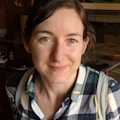Ashley Smart, Ph.D.
Stanford University
Ashley Smart’s first experience with scientific research was as an undergraduate in Karl Johnson’s lab at Pomona College, where she looked at the impact of proteoglycans on axon guidance in developing embryos. The ability to do experiments to answer questions and to see the effects of manipulating proteins herself convinced her that research was the career for her. She went to graduate school at the University of California, San Francisco, where she worked in Jim Wells’ and Grae Davis’ labs. She was interested in how caspases — normally proteins that kill cells — could precisely remove single-axon branches or dendrites without killing the cell. To be able to control the location and amount of caspase expression herself, she engineered a light-activated caspase that she could express and test in fruit fly neurons. As a postdoc, she wanted to further explore how neurons could form circuits and lead to behavior. She joined Thomas Clandinin’s lab at Stanford, where she is trying to understand how the brain can keep track of time. Outside the lab, she loves drawing, and she has drawn botanical illustrations for a botanist at the California Academy of Sciences.
Principal Investigator: Thomas Clandinin
Fellow: Niyathi Annamaneni
Project
There is no dedicated sensory organ for time, and yet our brains can keep track of time and use it to modify behaviors. Many animals are capable of keeping track of short intervals of time and frequently use this information to optimize foraging; however, it’s still unclear how any brain can track time. This project will use a behavioral assay developed by Ashley Smart to test a variety of fruit fly mutants and determine if certain proteins or neurons are involved in timekeeping. It will involve generating fruit fly lines, learning the behavioral assay and analyzing data. Additionally, if target proteins or neurons are identified, they will be tested in an ethologically relevant foraging assay that measures differences in foraging patterns.